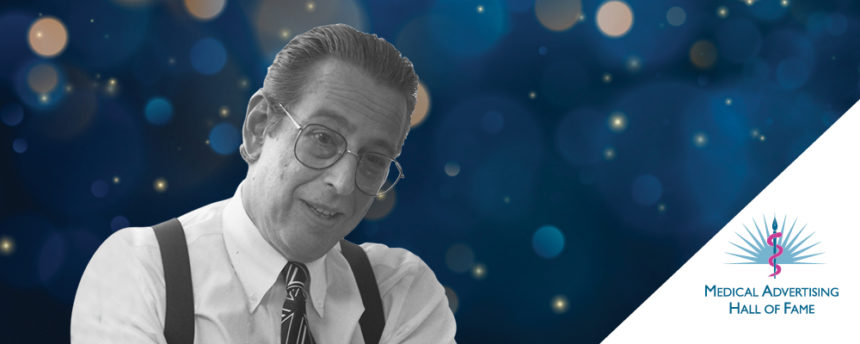Agency entrepreneurs Tom Harrison and Larry Lesser headline this year’s Medical Advertising Hall of Fame class alongside Service to Industry award recipient John Kamp.
Larry Lesser
Neil Matheson, chairman of Atlantis Healthcare and former Huntsworth Health prexy, recalls his first meeting with Larry Lesser as if it happened yesterday. The year was 1996 and Matheson, then an executive with the UK-based Oxford Clinical Communications, needed advice on bolstering the agency’s North American presence. A friend put him in touch with Lesser, a legendary industry figure who co-founded Medicus Communications and pioneered consumer healthcare advertising.
They met in Lesser’s wood-paneled office at DMB&B, at which Lesser had eased into the role of respected elder. He wore his hair slicked back and donned suspenders and a bow tie, giving off a distinct Mad Men vibe. A few minutes into that first conversation, Matheson felt as if he’d made a friend for life.
“Larry was a very open-hearted sort of guy,” he says. “There were no pretensions about him.”
Matheson traces this to Lesser’s upbringing in Brooklyn, where he graduated from James Madison High School, the same school that counts Bernie Sanders, Chuck Schumer and Ruth Bader Ginsburg among its alumni. Lesser loved sharing stories from back in the day, among them one in which he asked his parents what a close friend’s “Uncle Paulie” was doing on the front page of the New York Times. As it turns out, Uncle Paulie was notorious underworld figure Paul Castellano.
In a nascent industry, Lesser’s combination of personal warmth and street smarts helped him see – and seize – opportunities that his peers were slower to spot. His career began in 1959 at Friend Reiss Advertising and took off when he joined the LW Frohlich Intercon Agency four years later. There, Lesser rose from traffic manager to a range of increasingly senior client service posts to membership on the firm’s executive committee.
It’s also where he met Bill Castagnoli, one of the people with whom he’d founded Medicus Communications (Ed Dent was the other). The three opened their doors the year after Bill Frohlich’s death in 1971 led to the dissolution of the previous agency, bringing 16 employees and three clients – Marion Merrell Dow, Procter & Gamble and Schering Plough – with them. In 1973, Medicus promoted P&G’s Crest toothpaste brand to HCPs, which is believed to be the first time any consumer healthcare product had been marketed to a professional audience.
When Benton and Bowles acquired Medicus in 1978, Lesser became president and CEO of Medicus Group International. Two years later, he played a leading role in the company’s acquisition of Intercon International – which, renamed Medicus Intercon International. After the firm’s purchase of ADA Group in 1985, it sat atop the agency world with annual billings of $160 million.
Other successes followed, including one of the first national DTC television campaigns (for Marion Merrell Dow’s blockbuster allergy drug Seldane) in 1986. By the time Lesser retired in October 1997, Medicus had 27 offices in 16 countries.
His career, however, was far from over – which, given the requirement that all would-be MAHF inductees must be fully retired before they can be considered for enshrinement, probably explains why the Hall didn’t come calling until now. He teamed with Matheson to found ApotheCom Associates in September 1999. The two also established a holding company, AXIS Healthcare Communications; Lesser served as its chairman. When AXIS was sold to Huntsworth in 2007, Lesser retired once again… only to serve as a board member for Catalyst, a digital media agency started by two of his daughters’ college friends that was eventually sold to WPP, with Lesser helping engineer the deal.
“Larry was doing so many things, but they really weren’t visible and mainstream. And he didn’t have a lot of time for awards ceremonies or getting prizes or getting on all the different committees,” Matheson notes.
That said, Matheson believes Lesser would have been exceedingly proud of the MAHF recognition. “Even though he wouldn’t seek out the limelight, he would have loved that his wife, daughters and grandchildren would see that he had achieved this.”
Larry Lesser died in 2017 at the age of 77.
From the February 01, 2020 Issue of MM+M - Medical Marketing and Media








